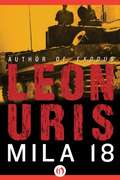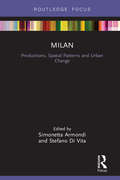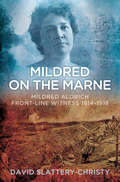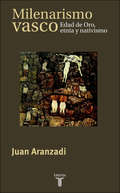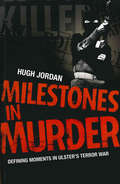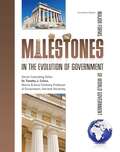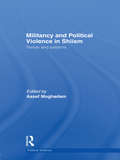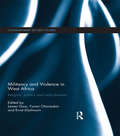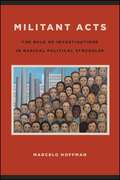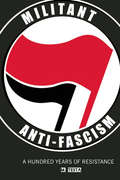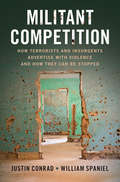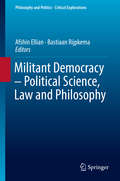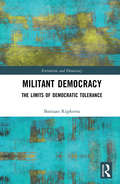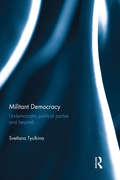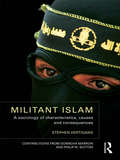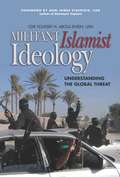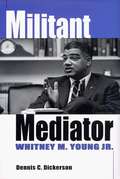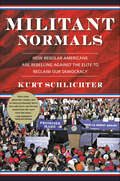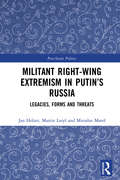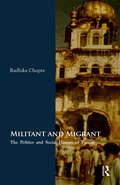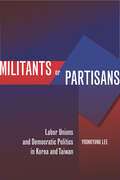- Table View
- List View
Mila 18
by Leon UrisIn a bunker underneath 18 Mila Street, a determined band of Warsaw Jews resist Nazi occupiers Italian-American journalist Christopher de Monti finds himself in Nazi-controlled Warsaw before the outbreak of World War II. Though wined and dined by German officers eager for sympathetic coverage, de Monti's nose for the real story soon leads him to discover the terrifying conditions of the Warsaw ghettos and the Nazis' chilling plans for the ghettos' inhabitants. He soon comes to know the Jewish resistance movement and joins their courageous--if doomed--last stand. Mila 18 is one of Uris's most powerful and heartfelt novels and is the product of meticulous research of pre-WWII Warsaw. This ebook features an illustrated biography of Leon Uris including rare photos from the author's estate.
Milan: Productions, Spatial Patterns and Urban Change (Built Environment City Studies)
by Stefano Di Vita Simonetta ArmondiAs a main urban centre of one of the most dynamic European regions, Milan is a key location from which to study narratives of innovations and contemporary productions – old and new manufacturing, tertiary and consumptive sectors, creative and cultural economy – and investigate their influence both on spatial patterns and urban policy agenda. Accordingly, this book explores the contentious geographies of innovation, productions and working spaces, both empirically and theoretically in a city that, since the beginning of the 2000s, has been involved in a process of urban change, with relevant spatial and socio-economic effects, within an increasingly turbulent world economy. Through this analysis, the book provides an insight into the complexity of contemporary urban phenomena beyond a traditional metropolitan lens, highlighting issues such as rescaling, urban decentralization and recentralization, extensive urban transformation and shrinkage and molecular urban regeneration. This book is a valuable resource for academics, researchers and scholars focusing on Urban Studies such as Urban Policy, Urban Planning, Urban Geography, Urban Economy and Urban Sociology.
Mildred on the Marne: Mildred Aldrich, Front-line Witness 1914-1918
by David Slattery-ChristyThis is the story of 61-year-old Mildred Aldrich and her experiences of the Great War. She retired to a small hill-top house called La Creste in February 1914, with views across the Marne river and valley, little realising she would become embroiled in the first major battle of the war. In spite of the danger she decided to stay and help the British soldiers. Her home was for a few days behind German lines but the British pushed the Germans into retreat and La Creste remained in British territory for the duration. They entrenched in the Marne Valley and Mildred's 'beloved panorama' as she described the view, turned into the valley of horror and death. Informed by journalist Mildred's unpublished journals and voices of those serving in the BEF, along with historical military background, this book examines events from the unique perspective of a remarkable woman who lived through them.
Milenarismo vasco: Edad de Oro, etnia y nativismo (La\otra Historia De España Ser. #Vol. 7)
by Juan AranzadiAnálisis desmitificador del nacionalismo vasco. Este mítico libro, publicado por primera vez en 1981, aparece ahora ampliamente revisado. Saltando constantemente las fronteras entre antropología, filosofía, historia, política, teología y sociología, la obra sigue siendo un texto de plena actualidad que sitúa al nacionalismo vasco en el amplio cauce de los movimientos milenaristas. En esta nueva edición Juan Aranzadi añade un capítulo sobre "El catolicismo vasco como religión étnica". Biografía del autor: Juan Aranzadi nació 1949 en Santurce (Vizcaya). Se licenció en Filosofía en la Universidad del País Vasco con una tesis sobre La Mimesis de Platón, y se doctoró en Antropología en la Universidad Nacional de Educación a Distancia (UNED) con una tesis sobre Semiología, música y piedad en la Antroposofía de Lévi-Strauss. Ha sido profesor de Historia de las Religiones en la Facultad de Filosofía de San Sebastian, y actualmente es titular de Antropología Social en la UNED. Es coautor, con Jon Juaristi y Patxo Unzueta, de Auto de terminación (El País-Aguilar, 1993).
Miles Gone By: A Literary Autobiography
by William F. BuckleyMiles Gone By is a landmark literary event: the autobiography of William F. Buckley Jr., woven from personal pieces composed over the course of a celebrated writing life of more than fifty years.Here is Buckley the boy, growing up in a family of ten rambunctious children, with a saintly mother and spirited father; Buckley the daring young political controversialist and enfant terrible whose debut book, God and Man at Yale, was a shocking New York Times bestseller; Buckley the editor of National Review, widely hailed as the founder of the modern conservative movement; Buckley the politician and mischievous humorist; Buckley the proud father and devoted husband; Buckley the spy and novelist of spies; and Buckley the yachtsman and bon vivant.Along the way, you’ll be treated to Buckley’s romance with wine, his love of the right word, his intoxication with music, and his joy in skiing and travel.You’ll also meet Buckley’s friends: Ronald Reagan, "zestfully concerned for the company of others”; Henry Kissinger "amusing, curious, ever-so-lightly irreverent”; Clare Boothe Luce, "a renowned beauty and man of affairs (a feminist, she stoutly resisted the stylistic effronteries of she-speech)”; Tom Wolfe, with "a trace of a Virginia accent, and of course there is the renowned diffidence, the matador taking tea with his mother”; John Kenneth Galbraith, who "consistently writes pleasant tributes to my own books, inevitably advising the reader that my political opinions should be ignored, my fiction or accounts of life at sea appreciated”; David Niven, of whom "my wife suspected that his magic was to induce a whim, so that he could gratify it”; and many others.This unforgettable work paints a wonderful and indelible picture of an extraordinary man and his extraordinary life.
Miles Gone By: A Literary Autobiography
by William F. Buckley Jr.Autobiography of the noted writer and commentator.
Miles Lord: The Maverick Judge Who Brought Corporate America to Justice
by Roberta WalburnThis is the story of Miles Lord (1919–2016), who rose from humble beginnings on Minnesota&’s Iron Range to become one of the most colorful and powerful judges in the country, described as &“an unabashed Prairie populist&” and &“a live-wire slayer of corporate behemoths.&” He cut a wide swath through history on his path to the bench: coming of age alongside a cadre of young Midwestern social-gospel progressives, including Hubert H. Humphrey, Eugene McCarthy, and Walter Mondale, in the days before they reached national fame; teaming with Bobby Kennedy as a hotshot prosecutor in pursuit of Jimmy Hoffa; and serving as the secret envoy between his friends Hubert and Eugene in their battle for the soul of the Democratic party in the historic 1968 presidential campaign. Later, after donning his black robe, he reshaped jurisprudence with precedent-breaking rulings—on issues ranging from women&’s rights to consumer protection to education reform—and breaking trail when he ordered the shutdown of the Reserve Mining Company in northern Minnesota, which was spewing its waste into Lake Superior, in the most sensational trial of the early environmental era.One of Judge Lord&’s landmark cases—and interlaced as a centerpiece narrative of this book—involved the Dalkon Shield intrauterine device, which caused horrific infections in thousands of women, resulting in infertility and sometimes death. Author Roberta Walburn served as the judge&’s law clerk during that litigation in 1983–84, and she provides a page-turning account (both an insider&’s view and an in-depth chronicle) of what was called &“one of the most disastrous episodes of American corporate misconduct.&” In the end, more than 200,000 women received nearly $3 billion in compensation, and the Fortune 500 defendant was left in ruins. But Judge Lord was hauled up on judicial misconduct charges for his no-holds-barred actions that were certainly provocative but also stand as a timely reminder, even (or especially) today, of the challenges in balancing the scales of justice for a legal system that too often skews to the rich and powerful.The author deftly weaves the Dalkon Shield drama into the larger story of the life of a one-of-a-kind man, crafting a sweeping and spirited true-life tale with not only her first-hand experiences as the judge&’s law clerk but also with unrestricted access to the judge&’s personal files. This is a rare and compelling portrait of a remarkable man and his place in both Minnesota and U.S. history.
Milestones in Murder: Defining Moments in Ulster's Terror War
by Hugh JordanBeginning with the death of legendary IRA figure Sean South of Garryowen on New Year's Day 1957, the book describes the background to what we have now come to call 'the troubles' and paints vivid portraits of the major players whose actions sparked the violence that erupted on the streets of Belfast and Derry in the summer of 1969. Throughout the decades of bloodshed, paramilitary leaders on both sides of the political divide continued to search for more so-called legitimate targets. Milestones in Murder charts how more and more innocent people were unwittingly drawn into the conflict against their will. It examines the killings which marked new lows in the republican/loyalist terror war, from the bombing of pubs and clubs to the advent of 'human bomb' couriers. It revisits the horrific murders of the Shankhill Butchers, exclusively revealing exactly who leader Lennie Murphy's accomplices were. This, amongst other revelations, will piece together several parts of the Irish warfare jigsaw for the first time. The book also covers the more recent murder of the author's colleague Martin O'Hagan, an act which sent shock waves through a battle-hardened media in Northern Ireland. O'Hagan was the first journalist in Ireland to lose his life at the hands of the paramilitaries and his death pushed the parameters of slaughter to new limits.
Milestones in the Evolution of Government (Major Forms of World Government)
by Leeanne GelletlyHow did large, complex states develop from small clans and nomadic tribes? How have rulers throughout history justified their right to govern? What ideas and events shaped the development of modern forms of government? Milestones in the Evolution of Government answers these and other important questions. The book provides students with the perspective to understand the basis for various forms of government-- including their own.
Militancy and Political Violence in Shiism: Trends and Patterns (Political Violence)
by Assaf MoghadamThis book is the first systematic assessment of current trends and patterns of militancy in Shii communities in the Middle East and South Asia - specifically in Iran, Iraq, but also in Lebanon, Saudi Arabia, Pakistan, Afghanistan, Kuwait, and Bahrain More than thirty years after the Islamic Revolution in Iran, there are signs of a growing assertiveness on the part of Shii actors, at times erupting into political violence. The book addresses two key questions: What trends emerge in the types of militancy Shii actors employ both inside and outside of the Shii heartland? And what are the main drivers of militancy in the Shii community? The editor concludes that although at present Shii assertiveness does not take on a predominantly militant form, a 'subculture of violence' does exist among most Shii communities examined here, and suggests five key drivers of political violence among Shiis: the impact of Iran; nationalism and anti-imperialism; Shii self-protection and communal advancement; mahdism; and organizational dynamics. This book will be of great interest to students and researchers of terrorism studies and political violence, war and conflict studies, and IR/Security Studies in general.
Militancy and Violence in West Africa: Religion, politics and radicalisation (Contemporary Security Studies)
by James Gow Ernst Dijxhoorn Funmi OlonisakinThis volume provides a systematic and cross-regional analysis of radicalisation, militancy and violence in West Africa. Concern about terrorism in, or from, West Africa, has been recognised in academic research, and the adoption of militarised approaches to addressing it questioned. However, the basis for that questioning – the need to investigate factors such as the historical and socio-economic roots of militancy – is not developed, nor is it substantiated in existing studies. The significant impact of religiously motivated radicalisation and violence in West Africa upon international security makes it essential to understand the issues of militancy and violence in the region. In this volume, the authors draw upon empirical research in West Africa to develop understanding in these areas. Over the course of several chapters written by leading experts in the field, the book successfully blends historical and conceptual analysis with new empirical research gathered from focus group discussions and research interviews. Each of these core studies is structured around five interrelated issues: tracing the antecedents of radicalisation; monitoring trends; identifying actors; anticipating possibilities; and analysing the strength of existing preventive mechanisms. This book will be of much interest to students of African security, African politics, radicalisation, political Islam, war and conflict studies and security studies in general.
Militant Acts: The Role of Investigations in Radical Political Struggles (SUNY series in New Political Science)
by Marcelo HoffmanMilitant Acts presents a broad history of the concept and practice of investigations in radical political struggles from the nineteenth century to the present. Radicals launched investigations into the conditions and struggles of the oppressed and exploited to stimulate their political mobilization and organization. These investigations assumed a variety of methodological forms in a wide range of geographical and institutional contexts, and they also drew support from the participation of intellectuals such as Marx, Lenin, Mao, Dunayevskaya, Foucault, and Badiou. Marcelo Hoffman analyzes newspapers, pamphlets, reports, and other source materials, which reveal the diverse histories, underappreciated difficulties, and theoretical import of investigations in radical political struggles. In so doing, he challenges readers to rethink the supposed failure of these investigations and concludes that the value of investigations in radical political struggles ultimately resides in the possibility of producing a new political "we."
Militant Anti-Fascism
by M. TestaFascism is not a thing of the past and, in this era of crisis and austerity, it is growing even stronger. The fight against it must be aggressive and unrelenting. Using a mixture of orthodox history and eyewitness accounts, "M. Testa" makes the case for a resolutely militant anti-fascism, taking us from proto-fascists in nineteenth-century Austria to modern-day street-fights in London. Provocative, unapologetic, and based on extensive research.M. Testa, undercover anti-fascist blogger, has analyzed the changing fortunes of the British far right since 2009. He has written for the anarchist magazine Freedom and is a member of the Anti-Fascist Network.
Militant Competition: How Terrorists and Insurgents Advertise with Violence and How They Can Be Stopped
by William Spaniel Justin ConradMilitant groups often use violence, perversely, to gain attention and resources. In this book, the authors analyze how terrorist and rebel organizations compete with one another to secure funding and supporters. The authors develop a strategic model of competitive violence among militant groups and test the model's implications with statistical analysis and case studies. A series of model extensions allow the authors to incorporate the full range of strategic actors, focusing in particular on government efforts to counter and deter violence. The results indicate that the direct effects of competition are not as clear as they may seem, and interventions to alter competitive incentives may backfire if states are not careful. This is a timely contribution to a growing body of political economy research on militant group fragmentation, rivalry, fratricide and demonstrative violence.
Militant Democracy – Political Science, Law and Philosophy (Philosophy and Politics - Critical Explorations #7)
by Afshin Ellian Bastiaan RijpkemaThis volume offers an up-to-date overview of the much-debated issue of how a democracy may defend itself against those who want to subvert it. The justifications, effectiveness and legal implications of militant democracy are discussed by addressing questions as: How can militant democracy measures such as party bans be justified? Why is it that some democracies ban antidemocratic parties? Does militant democracy succeed in combatting right-wing extremism? And is militant democracy evolving into an internationalized legal and political concept?Bringing together experts and perspectives from political science, law and philosophy, this volume advances our understanding of the current threats to democracy, a political system once thought almost invincible. It is especially timely in the light of the rise of illiberal democracy in the EU, the increasingly authoritarian rule in Turkey, the steady shift to autocracy in Russia and the remarkable election of Trump in the US.
Militant Democracy: The Limits of Democratic Tolerance (Extremism and Democracy)
by Bastiaan RijpkemaThis book aims to present a comprehensive theory of militant democracy and to answer questions such as: How can a democracy protect itself against its own downfall? And when is intervention against antidemocrats justified? Against the backdrop of historical and current examples, this book examines a variety of theories from philosophers and legal scholars such as Karl Loewenstein, Karl Popper and Carl Schmitt as well as contemporary alternatives. It compares their interpretations of democracy and militant democracy, discusses how helpful these references are, and introduces two largely forgotten theorists to the militant democracy debate: George van den Bergh and Milan Markovitch. Militant Democracy then sets out to build a novel theory of democratic self-defence on the basis of democracy’s capacity for self-correction. In doing so, it addresses the more classic and current criticisms of the concept, while paying specific attention to the position of the judge, the legal design and effectiveness of party bans, and the national and supranational procedural safeguards that can safeguard the careful application of militant democracy instruments. Militant Democracy seamlessly combines political philosophy, political science and constitutional law to offer a new perspective on democratic self-defence. This book is essential reading for scholars and students of political theory, jurisprudence, democracy, extremism and the history of ideas.
Militant Democracy: Undemocratic Political Parties and Beyond
by Svetlana TyulkinaThe term ‘militant democracy’ was coined by Karl Loewenstein in the 1930s. He argued that attempts to establish democracy in the Weimar Republic failed due to the lack of militancy against subversive movements. The concept of militant democracy was introduced to legal scholarship and constitutional practice so as to provide democracy with legal means to defend itself against the range of possible activities of non-democratic political actors. This book offers a broad comparative look at the legal concept of militant democracy. It analyses both theoretical and substantive aspects of this concept, investigating its practice in a number of countries and on a diverse array of issues. Examining cases in Australia, Turkey, Spain, Germany, Israel, India, the USA, and the Council of Europe, Svetlana Tyulkina maps the historical development of militant democracy in constitutional theory and explores its interaction with various traditional and contemporary notions of democracy. The book analyses the possibilities and pitfalls of the concept of militant democracy when applied to protect democracy when it is under threat of harm or destruction by undemocratic actors, and suggests possible solutions and measures to overcome those dangers. In its evaluation of the capacity and justification for democracies to apply militant democracy measures, this book will be of great use and interest to students and scholars of public comparative constitutional law, international law, human rights law, and comparative politics.
Militant Islam: A sociology of characteristics, causes and consequences
by Stephen VertigansMilitant Islam provides a sociological framework for understanding the rise and character of recent Islamic militancy. It takes a systematic approach to the phenomenon and includes analysis of cases from around the world, comparisons with militancy in other religions, and their causes and consequences. The sociological concepts and theories examined in the book include those associated with social closure, social movements, nationalism, risk, fear and ‘de-civilising’. These are applied within three main themes; characteristics of militant Islam, multi-layered causes and the consequences of militancy, in particular Western reactions within the ‘war on terror’. Interrelationships between religious and secular behaviour, ‘terrorism’ and ‘counter-terrorism’, popular support and opposition are explored. Through the examination of examples from across Muslim societies and communities, the analysis challenges the popular tendency to concentrate upon ‘al-Qa’ida’ and the Middle East. This book will be of interest to students of Sociology, Political Science and International Relations, in particular those taking courses on Islam, religion, terrorism, political violence and related regional studies.
Militant Islamist Ideology
by Youssef H., Aboul-EneinA top adviser at the Joint Intelligence Task Force for Combating Terrorism argues that winning the war against Militant Islamists requires a more nuanced understanding of their ideology. His book is among the first attempts to deconstruct and marginalize al-Qaida ideology using Islamic based arguments. By clearly defining the differences between Islam, Islamist, and Military Islamist, Aboul-Enein highlights how militant Islamist ideology takes fragments of Islamic history and theology and weaves them into a narrow, pseudo-intellectual ideology to justify their violence against Muslims and non-Muslims alike. In offering a comprehensive explanation of how Militant Islamists have hijacked the Islamic religion, Aboul-Enein provides a realistic description of the militant threat, which is different and distinct from Islamist political discourse and the wider religion of Islam.
Militant Mediator: Whitney M. Young, Jr
by Dennis C. DickersonAlone among his civil rights colleagues -- Martin Luther King Jr. , Roy Wilkins, James Farmer, John Lewis, and James Forman -- Whitney M. Young Jr. advocated integrationism embraced by both blacks and whites. As a National Urban League Official in the Midwest and as a dean of social work at Atlanta University during the 1940s and 1950s, Young blended interracial mediation with direct protest. He demonstrated that these methods pursued together were the best tactics for the civil rights movement, then put them to work on a national scale upon becoming the executive director of the League in 1961. In this position, Young forcefully alerted elite whites to the urgency of the black struggle for equality and urged them to spend federal, corporate, and foundation funds to lift residents in the nation's inner cities. Although he actively interacted with powerful whites, Young also drew support from middle- and working-class blacks who shared his belief in racial integration. As he navigated this middle ground Young came under fire from both black nationalists and white conservatives.
Militant Normals: How Regular Americans Are Rebelling Against the Elite to Reclaim Our Democracy
by Kurt SchlichterMilitant Normals, written by one of the conservative movement's wittiest commentators, is a no-holds-barred takedown of the preening elites who have all but made normalcy a crime in America.Donald Trump is only the beginning of a mighty disruption in American politics and culture, thanks to the rise of the militant Normals in America.They built this country, they make it run, and when called on, they fight for it. They are the heart and soul of the United States of America, They are the Normals, the regular Americans of all races, creeds, preferences, and both sexes who just want to raise their families and live their lives in peace. And they are getting angry. . . For decades they have seen their cherished beliefs and beloved traditions under attack. They have been told they are racist, sexist, and hateful, but it was all a lie. Their ability to provide for their families has been undermined by globalization with no consideration of the effects on Americans who did not go to Harvard, and who live in that vast forgotten space between New York and Santa Monica.A smug, condescending elite spanning both established parties has gripped the throat of the nation. Convinced of their own exquisite merit while refusing to be held accountable for their myriad failures, these elitists managed to suppress the first rumblings of discontent when they arose in the form of the Tea Party. But they were stunned when the Normals did not simply scurry back to their flyover homes. Instead, the Normals came out in force and elected Donald Trump.Now, as the ruling caste throws everything it can into the fight to depose Donald Trump and reestablish unchallenged control, the Normals face a choice. They can either surrender their country and their sovereignty, or they can become even more militant. . .
Militant Publics in India
by Arafaat A. ValianiAn historically informed ethnographic study of conceptions, arenas, and practices of physical training and militancy in the context of religious nationalism intwentieth-and twenty-first-century western India. Arafaat A. Valiani offers readers a telling glimpse and a rare insider perspective of the social world in which militants are made, explaining how group physical training and technico-ethical experimentswith ithave created a powerful religious nationalist movement in the Indian state of Gujarat that has been held responsible for carrying outmassive episodes of ethnic cleansing against Indian minorities. Aclose reading of Mohandas Gandhi's writing on popular mobilization and resistance and a detailed historical investigation of hitherto understudied episodes of "satyagraha" (Gandhi's celebrated concept of non-violence), this work illuminates debates on politics in South Asian history, anthropology, and sociology. Valiani interprets his own direct observation of Hindu nationalist pogroms in contemporary Gujarat, in addition to testimonies and ethnographic observations of the inner workings of the movement discovered by the author when he immersed himselfas a "trainee" within it. "
Militant Right-Wing Extremism in Putin’s Russia: Legacies, Forms and Threats (Post-Soviet Politics)
by Miroslav Mareš Martin Laryš Jan HolzerMilitancy continues to be characteristic of many supporters of the Russian far right, encompassing a belligerent rhetoric, a strong perception of participants as political warriors and often the use of physical violence. How serious a threat does Russian militant right-wing extremism pose to Russia and the World, and how has the level of threat changed over time? This book addresses this question by exploring right-wing extremism in Russia, its historical context and its resurgence over the past thirty years. Outlining the legacies and forms presented by current right-wing extremism, with a particular focus on militant extremism, it employs a historical, descriptive method to analyse the threats and risks posed. Presented within the framework of research on extremism and political violence related to the Russian political thought, the book outlines the key criteria of identifying threats, such as the level of violence, ability to gain supporters and penetration of governing elites. Primarily aimed at researchers and academics in political science, extremism, security studies and the history of Russia and Eastern, Central and South-East Europe, this book will also be of interest to political journalists and practitioners in international security.
Militant and Migrant: The Politics and Social History of Punjab
by Radhika ChopraThis book is a study of the transformations in Punjab created by biotechnological revolutions, economic restructuring, persistent migrations, and political upheaval in the late 20th century. The sacred centre at Amritsar, the transnational settlement of Southall and a Doaba village form the terrain for this — three sites that can seen as metonymic spaces of identity that transcend geographic boundaries, and form the structure of this book. Relations between the rural, the sacred and the transnational, fostered through migration, marriage and material exchange, existed well before 1984. After 1984, however, and through the violent decades of the militancy period, these three locations became connected via the circulation of political ideologies, violent deaths, financial aid, a sense of disaffection, and the migration of men. Analysis of the linkages between transnational migration and religious revival is a key theme of this study. Conversely, the enhanced engagements of the diaspora with homeland politics became a source of support and created sanctuary spaces for political asylum seekers and transnational migrant labour. Re-analysing existing material and drawing on fieldwork-based interviews, as well as local history archives, the book presents a different framework to analyse the politics and social history of Punjab.
Militants or Partisans
by Yoonkyung LeeThe exceptional experiences of South Korea and Taiwan in combining high growth and liberal democracy in a relatively short and similar timetable have brought scholarly attention to their economic and political transformations. This new work looks specifically at the operation of workers and unions in the decades since labor-repressive authoritarian rule ended, bringing Taiwan, in particular, into the literature on comparative labor politics. South Korean labor unions are commonly described as militant and confrontational, for they often take to the streets in raucous protest. Taiwanese unions are seen as moderate and practical, primarily working through formal political processes to lobby their agendas. In exploring how and why these post-democratization states have come to breed such different types of labor politics, Yoonkyung Lee traces the roots of their differences to how unions and political parties operated under authoritarianism, and points to ways in which those legacies continue to be perpetuated. By pairing two cases with many similarities, Lee persuasively uncovers factors that explain the significant variation at play.
